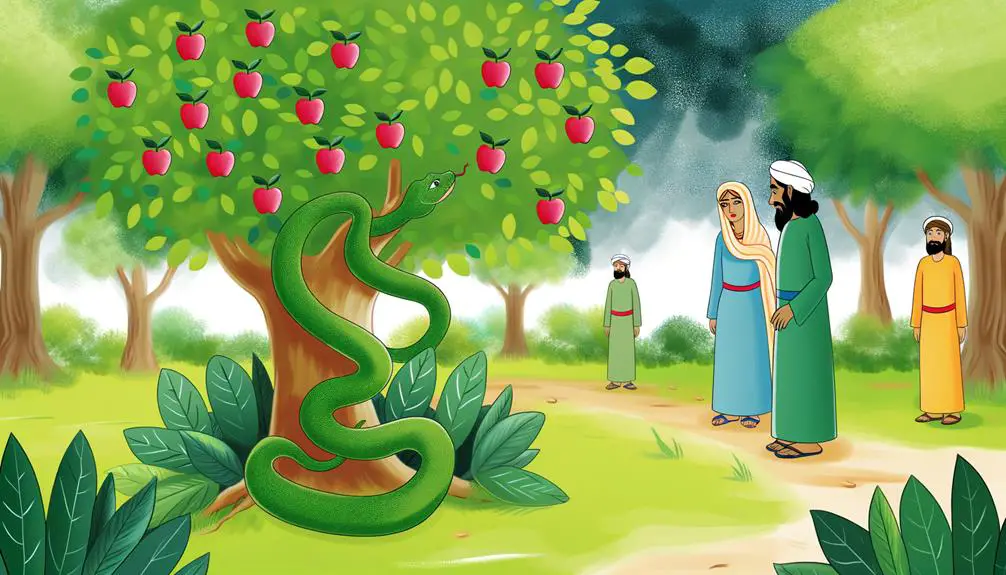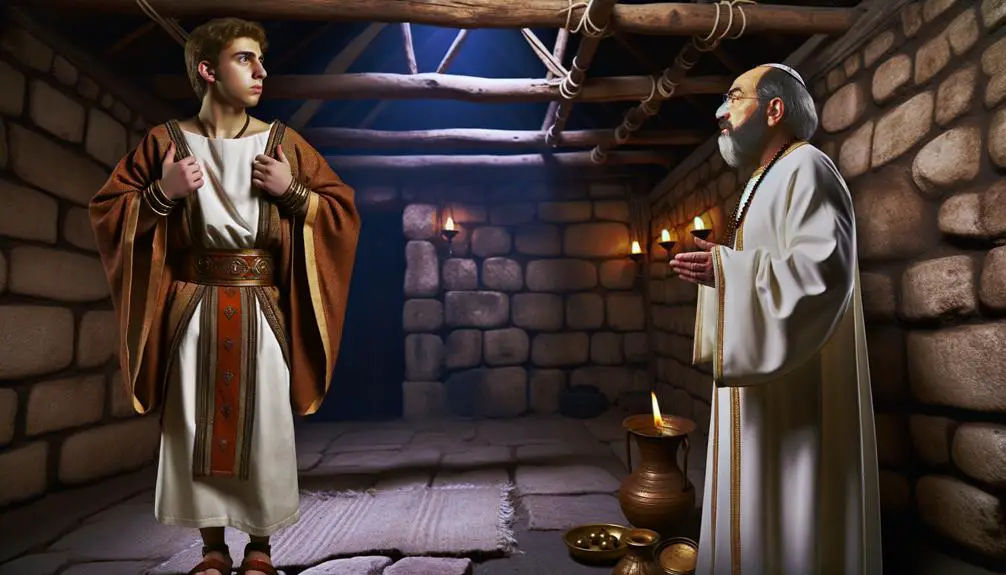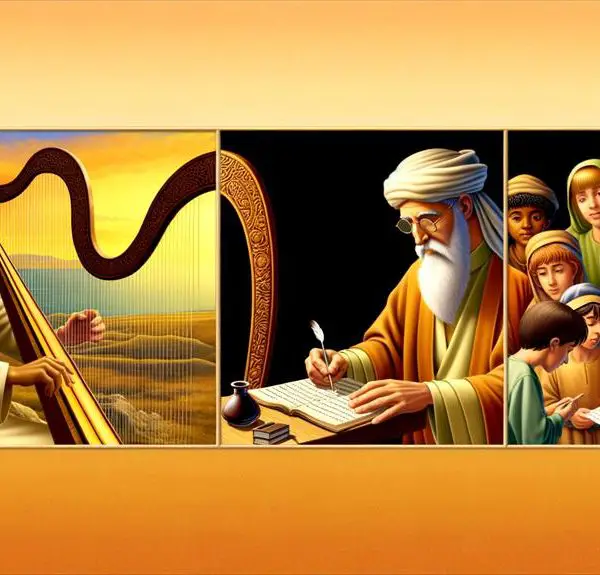Observe how biblical figures like Jacob and Abraham navigated truth and deceit—discover what their stories reveal about morality and human nature.

Examples of Lying in the Bible
In the Bible, deception often reveals complex moral issues and the frailties of human nature. You'll find the serpent tricking Eve in Eden, leading humanity into the first sin. Jacob, motivated by desire for a birthright, deceives his father Isaac with his mother's help to receive blessings meant for Esau, his brother. Also, when facing potential danger, Abraham claims his wife Sarah is his sister, fearing for his life. Each narrative, from Rahab misleading Jericho's spies to Peter denying Jesus during a perilous time, offers insight into the motives and consequences of deceit. Each tale invites further exploration into these layered depictions.
Key Takeaways
- The serpent deceives Eve by falsely promising she will not die from eating the forbidden fruit.
- Jacob deceives Isaac by pretending to be Esau to receive a blessing.
- Abraham misrepresents Sarah as his sister to protect himself in foreign lands.
- Rahab lies to the king of Jericho about hiding Israelite spies.
- Peter denies knowing Jesus three times despite being one of his closest followers.
The Serpent's Deceit in Eden

Although often overlooked, the serpent's deceit in Eden marks one of the earliest and most profound instances of lying in the Bible. This episode not only introduces the concept of sin through deception but also sets a precedent for the ethical dilemmas and temptation's impact that you'll encounter throughout the biblical narrative. When the serpent persuades Eve to eat the forbidden fruit, it cleverly distorts the truth, suggesting that the act will not lead to death but rather to enlightenment, making humans like God, knowing good and evil.
This pivotal moment highlights the complex interplay between truth and deception, illustrating how temptation can lead to dire consequences. It's a clear demonstration of how ethical choices aren't always straightforward or easy to navigate. The serpent's words introduce ambiguity into what might otherwise seem a clear moral directive from God, thus creating a profound ethical quandary.
As you reflect on this, consider how the serpent's actions frame the broader implications of lying. The deceit doesn't just affect the immediate players; it fundamentally alters the course of human history, underscoring the profound impact that ethical choices and temptation can have. This narrative sets the stage for the recurring themes of truth, deception, and morality that you'll see throughout the Scriptures.
Abraham's Misrepresentation of Sarah
You'll find that Abraham's decision to misrepresent his wife, Sarah, as his sister stems primarily from his fear for his own safety rather than a direct intention to deceive. This choice not only jeopardizes Sarah's position but also brings significant complications into their lives, highlighting the broader consequences of deception. By examining these incidents, you can gain insight into the complex interplay of personal fear and moral choices within biblical narratives.
Abraham's Fear Motivation
Driven by fear for his own safety, Abraham misrepresented Sarah as his sister rather than his wife during their sojourns. This scenario, viewed through an ethical analysis, reveals complexities in Abraham's decisions. In cultural context, such actions might be interpreted differently than they would be today. During that era, Abraham's fear might have seemed rational due to the potential threat to his life if he was known to be Sarah's husband. The ethical implications are multifaceted, however. On one hand, Abraham's actions could be seen as a pragmatic measure to protect both himself and Sarah. On the other hand, it raises questions about the morality of deceiving others for personal security. Your understanding of these events may vary depending on your perspectives on ethics and cultural relativism.
Consequences of Deception
Exploring the aftermath of Abraham's deception, we find that his portrayal of Sarah as his sister led to significant ethical and social repercussions. This act, driven by fear for his own life, resulted in Sarah being taken into Pharaoh's household, potentially compromising her marital fidelity and Abraham's integrity. The truth consequences of this deception illuminate the ethical dilemmas inherent in choosing deceit as a protective mechanism. It raises questions about the balance between self-preservation and moral responsibility. Moreover, the narrative highlights how Abraham's actions created a complex situation that required divine intervention to rectify. This episode in the Bible serves as a profound example of how the repercussions of deceit can extend beyond immediate personal safety, affecting broader relational and societal dynamics.
Isaac's Lie About Rebekah

As you explore Isaac's lie about Rebekah, consider the motivations behind his protective deception. Analyze how this act might reflect a broader identity crisis for Rebekah, questioning her role and autonomy within their narrative. It's important to evaluate the implications of these actions on their personal dynamics and the broader ethical landscape presented in the biblical text.
Isaac's Protective Deception
While residing in Gerar, Isaac deceitfully presented his wife Rebekah as his sister, a lie motivated by fear for his own safety. This deception illuminates complex family dynamics and ethical dilemmas inherent within their relationship. Isaac's choice to misrepresent Rebekah's identity to King Abimelech of Gerar reflects a protective instinct, yet it also exposes Rebekah to potential harm, raising questions about the balance between self-preservation and moral duty. The ethical quandaries in this narrative are emblematic of broader themes in the Bible, where characters often face decisions between personal safety and ethical integrity. Analyzing Isaac's decision through this lens offers deeper insight into the motivations and societal pressures that shaped his actions, and by extension, the actions of his family.
Rebekah's Identity Crisis
Rebekah's identity, misrepresented by Isaac's claim that she was his sister rather than his wife, not only placed her in a vulnerable position but also sparked a profound crisis of identity and security within their marriage. This manipulation, a strategic move to protect himself, utilized identity tactics that compromised Rebekah's autonomy and integrity. By analyzing this situation, you can discern the crisis consequences that emerge from such deceit. The lie not only endangered Rebekah by exposing her to potential harm from other men, such as King Abimelech, but also sowed seeds of distrust within their marital relationship. This narrative underscores the intricate impact of identity deception, illustrating how protective lies can backfire, undermining the very security they aim to bolster.
Jacob's Deception for Blessing
In the narrative of Jacob's deception, he cunningly secures his father Isaac's blessing, intended for his elder brother Esau, through a well-planned guise. This episode raises significant questions about family dynamics and ethical dilemmas within Biblical contexts. Jacob, encouraged by his mother Rebekah, disguises himself as Esau by donning his brother's garments and covering his arms and neck with goatskins to mimic Esau's hairy skin. In this manner disguised, Jacob presents himself to Isaac, who is visually impaired due to old age.
This act of deceit not only highlights the complexities within the family but also foregrounds the tensions between divine prophecy and human agency. The narrative previously establishes that Jacob is destined to be the stronger and more successful of the twins, as revealed to Rebekah during her pregnancy. However, the manner in which this prophetic outcome is achieved—through deceit and manipulation—introduces a profound ethical dilemma. It prompts individuals to ponder whether the ends justify the means, especially when those means involve deception within a family.
Furthermore, the repercussions of Jacob's actions are significant, affecting his relationship with Esau and leading to a prolonged period of estrangement and conflict. This story, hence, serves as a rich ground for exploring themes of trust, betrayal, and the consequences of ethical choices within familial relationships.
Joseph's Brothers Falsify His Death

Joseph's brothers, driven by envy, deceitfully reported his death to their father Jacob, presenting a blood-stained coat as false evidence of a fatal attack. This act, stemming from profound sibling rivalry, is a striking example of the complex dynamics that can pervade familial relationships. The deception not only reflects the brothers' malice toward Joseph, who was favored by their father, but also underscores a broader theme of rivalry and conflict within biblical narratives.
Analyzing this episode, it's clear that the brothers' lie was not merely a spontaneous act of jealousy, but a calculated move to eliminate what they perceived as a threat to their own standing within the family hierarchy. The emotional trauma inflicted on Jacob by this news is profound, illustrating the deep wounds that deceit within a family can cause. Jacob's mourning for Joseph is a poignant indication of the devastating impact of the brothers' falsehood.
Moreover, this narrative invites reflection on the consequences of deceit. While initially successful in their ruse, Joseph's brothers later faced moral reckoning and the complex repercussions of their actions. This story serves as a powerful reminder of the long-lasting effects that lies can have, impacting both the deceiver and the deceived in profound ways.
Rahab Misleads Jericho's Spies
Rahab's deliberate deception of the king's men, claiming ignorance of the Israelite spies' whereabouts, highlights another instance of strategic falsehood in biblical stories. Her actions are pivotal, not only in the narrative of the fall of Jericho but also in understanding the complex dynamics of loyalty and survival in biblical texts. Rahab's allegiance to the Israelites, rather than her own people of Jericho, marks a significant turning point in the story. By hiding the spies and misleading the king's men, Rahab directly influences Jericho's fate, setting the stage for its eventual conquest.
This episode raises questions about the ethical dimensions of Rahab's lie. From a scholarly perspective, you might consider whether her actions are justified by her faith in God's plan, as suggested by her later inclusion in the genealogy of Jesus in the New Covenant. This inclusion indicates a positive valuation of her actions despite the deception involved.
Analyzing Rahab's decision within the context of biblical morality, it becomes apparent that her lie is portrayed as a necessary evil. It's a means to a greater good, demonstrating the complexity of ethical decisions in wartime scenarios. Her story complicates the often simplistic narrative of right and wrong, showing that the biblical texts acknowledge the murky waters of real human conflict and survival strategies.
David's Deception of Ahimelech

David's deceit of Ahimelech, wherein he feigns madness to escape the priest's suspicion, serves as another intriguing example of biblical figures employing deception to navigate perilous circumstances. In this scenario, David, fleeing from King Saul's murderous intentions, seeks refuge and ends up at Nob, where Ahimelech the priest resides. David's actions here are complex, driven by his immediate need for safety and the larger context of his loyalty to God's anointed king, Saul, despite Saul's hostility.
When you explore further into this account from 1 Samuel 21, you observe that David's deception involves claiming that he's on a secret king's mission, needing provisions and a weapon, which leads Ahimelech to provide the Holy Bread and Goliath's sword. This act of deception places Ahimelech and the other priests in a precarious position without their knowledge, highlighting the often-overlooked theme of priestly consequences in biblical narratives.
The fallout from David's actions is severe. Doeg the Edomite, present during David's visit, later reports this to Saul, leading to the death of Ahimelech and other priests of Nob. This narrative segment emphasizes the gravity and unintended consequences of deceit, even when used for survival, underscoring the complex interplay between personal survival and broader ethical considerations in biblical texts.
Peter Denies Knowing Jesus
While examining instances of deception for survival in the Bible, we encounter Peter's denial of Jesus, a moment that starkly contrasts with his prior declarations of loyalty. This incident, unfolding in the Gospel narratives, underscores the complexities of disciple loyalty under duress. Peter, once fervent in his commitment, faces the ultimate test when Jesus is arrested. Despite his earlier promise to stand by Jesus, fear and self-preservation lead him to deny any association with Him, not once but three times.
This sequence culminates dramatically with the cock crowing, fulfilling Jesus' prophecy about Peter's denial. This auditory cue not only marks the moment of realization for Peter but also serves as a pivotal symbol in the narrative, highlighting the frailty of human resolve when confronted with existential threats. The cock's crow acts as a stark auditory reminder of both prophecy and personal failure.
This episode invites you to reflect on the psychological and emotional turmoil experienced by Peter. It raises questions about the nature of loyalty and the factors influencing one's adherence to it under pressure. The incident is not just a reflection of Peter's weakness but also illuminates the broader theme of human fallibility in the face of fear and danger, a recurring motif in biblical texts.
Frequently Asked Questions
How Does Lying Affect Relationships in Biblical Narratives?
In biblical narratives, lying often leads to trust erosion and moral conflicts, impacting relationships deeply. You see how deceit complicates interactions and undermines the foundation of trust essential for healthy, enduring relationships.
What Are the Consequences of Deceit Mentioned in the Bible?
In biblical texts, deceit often leads to divine retribution and moral decay, reflecting the severe consequences of such actions. You'll find that dishonesty disrupts communal and divine relationships, emphasizing integrity's importance.
Is Repentance Shown by Liars in Biblical Stories?
In many narratives, liars who demonstrate sincere repentance often receive divine forgiveness, highlighting the complex interplay between human guilt and moral redemption. This dynamic underlines essential theological principles concerning sin and atonement.
Are There Any Parables About Lying Told by Jesus?
You'll find that Jesus didn't specifically tell parables about lying. However, his teachings often emphasize moral lessons on the importance of truth, guiding you to understand broader ethical principles through his narratives.
How Do Biblical Lies Compare to Lies in Other Religious Texts?
In comparative theology, you'll find that biblical lies and those in other religious texts vary in context and ethical implications, reflecting diverse scriptural ethics and cultural interpretations across different faith traditions.



Sign up